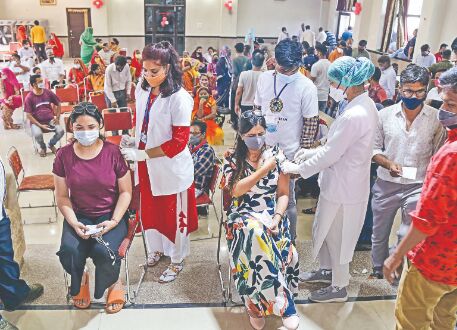Centre approves Rs 23,123-cr emergency response package

New Delhi: In the first Cabinet meeting on Thursday after a major rejig, a Rs 23,123-crore financial package for improving health infrastructure in the country to fight the Covid pandemic was approved.
Addressing a press conference here, Union Health minister Mansukh Mandaviya said the package will be implemented over the next nine months till March 2022.
The meeting was chaired by Prime Minister Narendra Modi. Mandaviya said this is the second phase of the Emergency Response and Health System Preparedness Package as the Central government had given Rs 15,000 crore earlier for setting up Covid-dedicated hospitals and health centres across the country. Mandaviya added that under the new package, the Centre would provide Rs 15,000 crore and states Rs 8,000 crore and the plan would be implemented jointly by them across all the 736 districts of the country to improve medical infrastructure at primary and district health centres.
Around 2.4 lakh normal medical beds and 20,000 ICU beds would be created of which 20 percent would be specially earmarked for children, he said. The minister said storage facilities for oxygen and medicines would also be created at the district level under the plan.
The plan aims to accelerate health system preparedness for immediate responsiveness for early prevention, detection and management of Covid with the focus on infrastructure development, including for paediatric care and with measurable outcomes, he said.
Meanwhile, India recorded a single-day rise of 45,892 new cases, taking its infection tally to 3,07,09,557, while the count of active cases increased slightly to 4,60,704 after being low for nearly 55 days, according to the Union Health ministry on Thursday.
Sanofi and GSK have received approval for their Phase 3 clinical study in India to assess the safety, efficacy and immunogenicity of their adjuvanted recombinant-protein COVID-19 vaccine candidate.
Raising concern over certain districts reporting high Covid positivity rate, the Centre has called for stricter action to control the spread of infection.
Health Secretary Rajesh Bhushan has written to eight states with high positivity rates, urging them to take immediate action to bring down cases and also share details of the actions taken as per the Disaster Management Act.
The states that have received the communication sent out by the Health ministry are Arunachal Pradesh, Manipur, Kerala, Assam, Meghalaya, Tripura, Odisha and Sikkim. These states have the maximum number of districts with above 10 per cent positivity.
India's death toll has climbed to 4,05,028 with 817 new fatalities being reported. The number of active cases comprises 1.50 per cent of the total infections, while the national COVID-19 recovery rate stands at 97.18 per cent, data updated by the ministry at 8 am showed.
An increase of 784 cases has been recorded in the active COVID-19 caseload in a span of 24 hours, it showed.
The global, randomised, double-blind Phase 3 study will include more than 35,000 volunteers aged 18 and older across sites in the US, Asia, Africa, and Latin America, Sanofi said in a statement on Thursday.
"India is participating in Sanofi Pasteur's pivotal Phase 3 study, and subject to subsequent approvals, we should soon begin enrollment of study participants in the country," Sanofi Pasteur India, Country Head, Annapurna Das said.
As the virus continues to evolve, "we are anticipating what will be needed in the coming months and years, and accordingly, have adapted our vaccine development programme," she added.
Das said the vaccine can make an important contribution to the fight against COVID-19.
"We believe our COVID-19 adjuvanted, recombinant vaccine can make a significant contribution to the ongoing fight against COVID-19 and are committed to initiating our clinical programme in India, at the earliest," Das said.
The primary endpoint of the study is the prevention of symptomatic COVID-19 in SARSCoV-2 naive adults, with secondary endpoints being the prevention of severe COVID-19 disease and prevention of asymptomatic infection, Sanofi said.
In a two-stage approach, the study will initially investigate the efficacy of a vaccine formulation targeting the original virus strain, while a second stage will evaluate a second formulation targeting the Beta variant, it added.
The design of the Phase 3 study, conducted across a broad diversity of geographies, also allows evaluation of the efficacy of the candidate against a variety of circulating variants, the statement maintained.
Sanofi and GSK will also run clinical studies to assess the ability of the adjuvanted recombinant-protein COVID-19 vaccine candidate to generate a strong booster response regardless of the type of vaccine initially received.
"In the partnership between the two companies, Sanofi provides its recombinant antigen and GSK contributes its pandemic adjuvant, both established vaccine platforms that have proven successful against influenza," Sanofi said.
The recombinant technology combined with GSK's adjuvant is designed to offer the advantages of stability at temperatures used for routine vaccines, making it easily implementable and easier to distribute at a global scale through existing infrastructures where vaccines are stored at normal refrigerator temperature, it added.
In addition to the adjuvanted recombinant protein-based vaccine in collaboration with GSK, Sanofi is developing a messenger RNA vaccine in partnership with Translate Bio.




